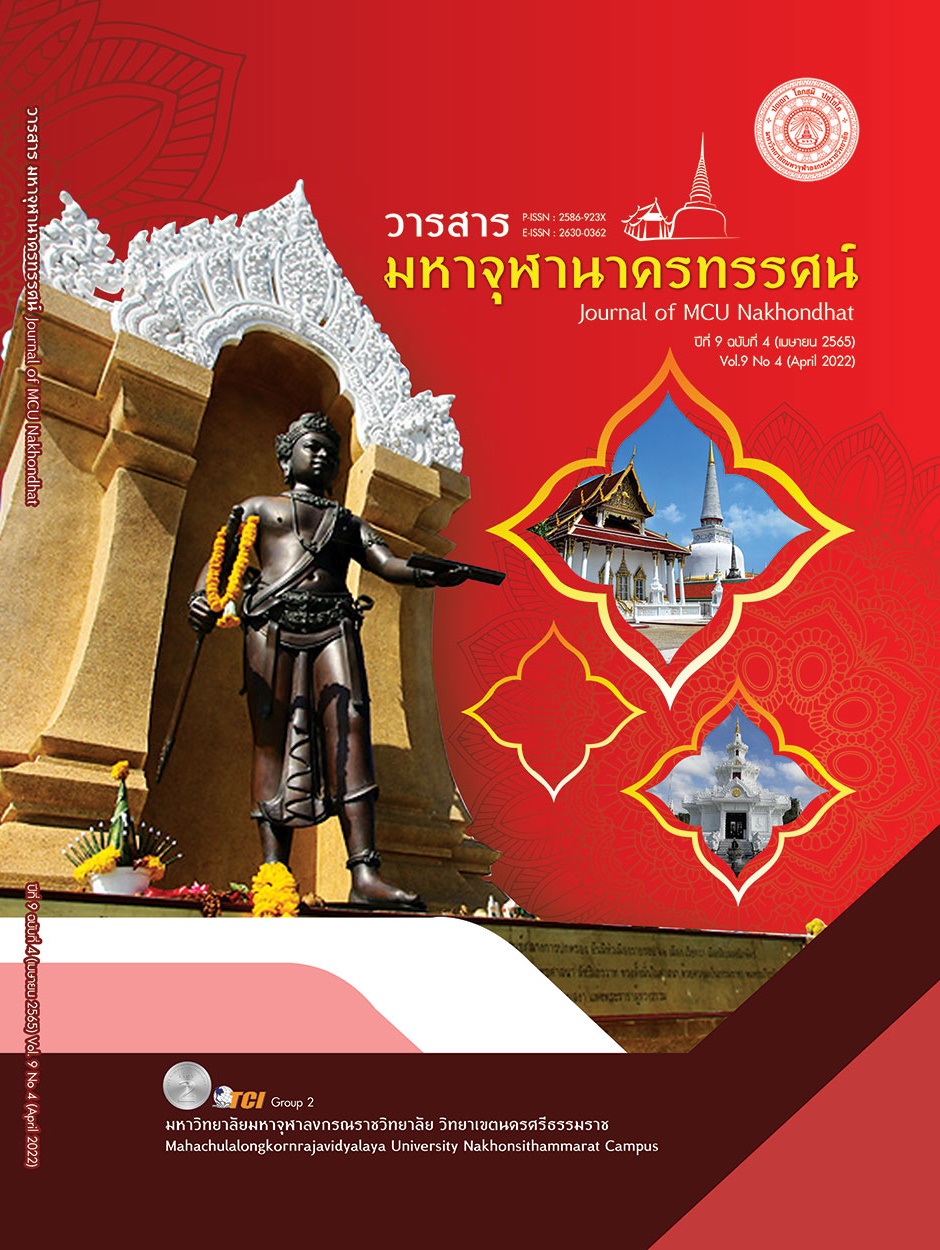ANALYSIS OF THAI POLITICS AND GOVERNMENT ACCORDING TO BUDDHISM
Main Article Content
Abstract
Policy according to the model of stateism, policy is the result of the decision to exercise the legal power (Authority). Policy is the state power (State Power) that is considered legitimacy and independent in decision-making in the policy-making process because this type of state is considered the mechanism of States, such as governments, government agencies are sovereigns, they can create different bureaucratic guidelines that fully bind the political society. Enforcement of laws or the exercise of monopoly on state power by law or political tradition Although each policy that has come out has a different level of power, such as a policy at a high compulsory level. to a campaign-level policy or inviting requests or requests for cooperation They are all the politics of policy-making in the form of representative democracy or contest-driven democracy, who or any political party wins the outcome of an election. The political party group is free to decide the exercise of power. Therefore, it is the politics in a representative democracy where the winners of independent elections in every policy-making process are win-and-win, make decisions on their behalf, and act on behalf of the people within the state. Policies based on pluralist and communal states Policies are the result of a rivalry between organizations and institutions in order to ensure that policies meet the wishes or goals of the different groups of organizations or movements. Policy is, in essence, an approach that is more definitely a consequence of the struggle between the powers of different social groups than the exercise of power in politics.
Article Details

This work is licensed under a Creative Commons Attribution-NonCommercial-NoDerivatives 4.0 International License.
References
เฉลิมพล ประทีปปะวณิช. (2520). ทฤษฎีการเมืองแห่งนวสมัย พระนคร. กรุงเทพมหานคร: โรงพิมพ์มหาวิทยาลัยรามคำแหง.
ชัยวุฒิ เขมะรังสี. (2561). การศึกษาหลักธรรมาภิบาลของสหกรณ์ออมทรัพย์ในประเทศไทย. วารสารการเมือง การบริหาร และกฎหมาย, 11 (3), 353 – 377.
ฐานิตา เฉลิมช่วง. (2559). ปัจจัยการมีส่วนร่วมทางการเมืองของประชาชน ในระดับเทศบาล จังหวัดฉะเชิงเทรา. วารสารชุมชนวิจัย, 10(1), 82-90.
บุศรา โพธิสุข. (2559). การมีส่วนร่วมทางการเมืองท้องถิ่นของประชาชน: ศึกษาเฉพาะกรณีตำบลช้างเผือกอำเภอเมือง จังหวัดเชียงใหม่. พิฆเนศวร์สาร, 12(1), 151-162.
พระครูปลัดสุพัฒ ผาสุโก (แก้วประเสริฐ). (2559). การมีส่วนร่วมทางการเมืองในระบอบประชาธิปไตยของประชาชนอำเภอรัตนบุรี จังหวัดสุรินทร์. วารสารธรรมทรรศน์, 16(3), 177-190.
พฤศจิกายน. (2564). การรับรู้ข่าวสารทางการเมืองและทัศนคติของผู้บริโภคกับความเป็นกลางของหนังสือพิมพ์ออนไลน์. เรียกใช้เมื่อ 10 พฤศจิกายน 2564 จาก http://gscm.nida.ac.th/public-action/Proceeding/2558/2-6.pdf
สำนักงานเลขาธิการสภาผู้แทนราษฎร. (2554). การมีส่วนร่วมทางการเมืองของประชาชน. กรุงเทพมหานคร: สำนักการพิมพ์สำนักเลขาธิการสภาผู้แทนราษฎร.
สุชาดา ทวีสิทธิ์. (2552). ลุ่มน้ำโขงศึกษา: สายน้ำ ผู้คน ชายแดน วัฒนธรรม การค้า การเมือง. วารสารศิลปศาสตร์ มหาวิทยาลัยอุบลราชธานี, 5(ฉบับพิเศษ), 6-16.
สุดชีวัน นันทวัน ณ อยุธยา. (2558). การจัดการการท่องเที่ยวเชิงวัฒนธรรมโดยชุมชนเป็นศูนย์กลาง. ใน รายงานการศึกษาอิสระปริญญาศิลปศาสตรมหาบัณฑิต สาขาวิชาเศรษฐศาสตร์การเมืองบัณฑิตวิทยาลัย. มหาวิทยาลัยเชียงใหม่.
สุริยา สมุทคุปติ์ และคณะ. (2543). การเมืองวัฒนธรรมในบุญผะเหวดร้อยเอ็ด. นครราชสีมา: ห้องไทยศึกษานิทัศน์.
อนุสรณ์ ศิริชาติ. (2564). การรับรู้ข่าวสารทางการเมืองและทัศนคติของผู้บริโภคกับความเป็นกลางของหนังสือพิมพ์ออนไลน์. เรียกใช้เมื่อ 10 พฤศจิกายน 2564 จาก http://gscm.nida.ac.th/public-action/Proceeding/2558/2-6.pdf
อาดิษฐ์ อินทรจักร. (2552). การมีส่วนร่วมของประชาชนในการจัดทำแผนพัฒนาตำบลเวียงพร้าวอำเภอเวียงพร้าว จังหวัดเชียงใหม่. ใน การศึกษาค้นคว้าอิสระปริญญารัฐศาสตรมหาบัณฑิตสาขาการเมืองและการปกครอง. มหาวิทยาลัยเชียงใหม่.


